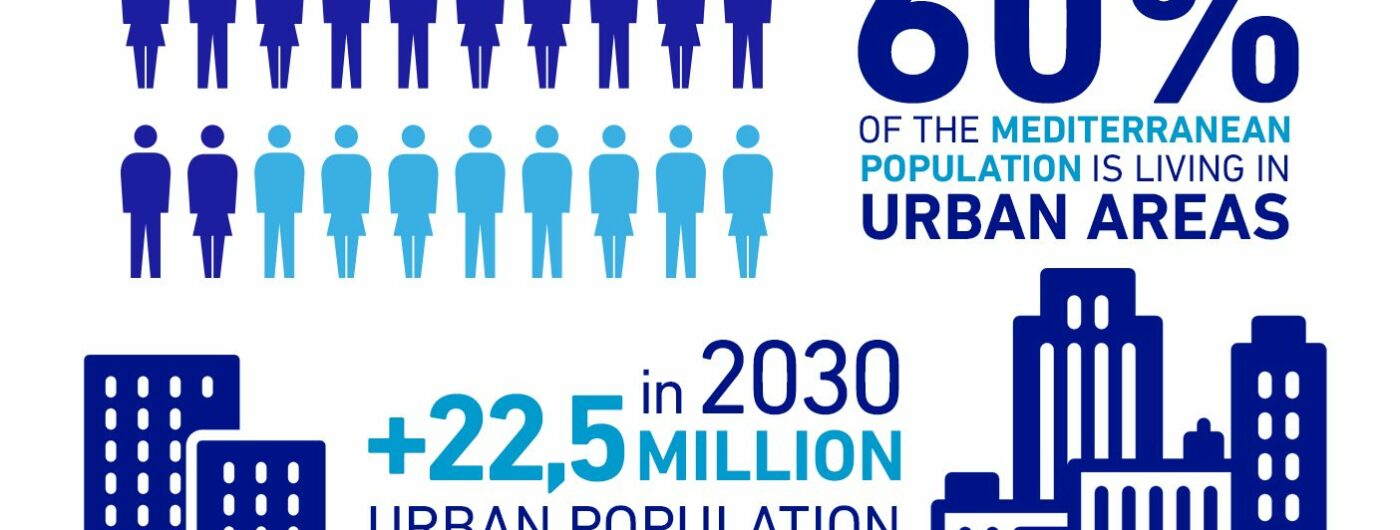
UfM urban projects aim to raise the living standards of over 7 million people in the Mediterranean
Barcelona, 2 October 2017. Currently 60% of the Mediterranean’s population is living in urban areas. With one of the fastest urbanisation rates worldwide, the region’s urban population is expected to increase by an additional 22.5 million by 2030 due to persistent rural-urban migrations and endogenous urban growth. Mediterranean cities are also experiencing high vulnerability to the effects of climate change such as water scarcity, droughts, forest fires and heat waves.
Therefore sustainable urban development plays a central role in addressing this transition while fostering job creation, inclusive growth and rising living standards. The Union for the Mediterranean supports World Habitat Day’s message to improve urban areas as a key contributing factor to human and sustainable development and to stability and integration in the region.
To this end the UfM is promoting an action-oriented urban agenda in the region, as agreed by Ministers in charge of housing, municipal affairs and urban development from the 43 Member States at the 2nd Ministerial Conference on Sustainable Urban Development held in Cairo last May. This conference also saw the launch of the UfM-labelled Imbaba Urban Upgrading Project, which aims to positively impact over 2 million people living in one of the most populated urban areas in the Giza Governorate in Egypt. Currently the UfM has a total of five urban development projects, including Imbaba’s. All these projects are expected to improve the living conditions of over 7 million people in Egypt, Tunisia, Morocco, Palestine and Turkey.
The UfM provides a unique platform in the Mediterranean region to promote dialogue, foster sustainable urban development and mobilise urban finance in a region that will need an estimated €60 billion in investment in the next 20 years. “The improvement of living conditions in our region, where urban growth is rapidly increasing due to demographic and environmental pressure, is key to sustainable development,” said Ihab Fahmy, UfM Deputy Secretary General for Transport and Urban Development. “A holistic approach which brings together governments, institutions, donors, the private sector and all the key stakeholders is crucial to provide the region with collective and concerted answers.”
As part of the UN 2030 Agenda for Sustainable Development and the new UfM action-oriented roadmap for enhanced regional cooperation, the UfM Secretariat concluded important agreements with key players such as UN-Habitat with a view to promoting joint initiatives to make cities inclusive, resilient, sustainable and safe. Furthermore, on 9 November the Secretariat will hold the 1st UfM Regional Platform on Sustainable Urban Development in Barcelona with the aim of identifying innovative approaches and initiatives to implement the UfM Urban Agenda in the region.
Background info:
UfM-labelled Projects
The UfM Secretariat is actively working with all its partners across the region to foster sustainable urban development via concrete projects and initiatives:
Imbaba Urban Upgrading Project’s main objective is to strengthen the integration of Imbaba, one of the most populated urban areas within the Giza Governorate, with the rest of Greater Cairo by providing its inhabitants with the basic facilities, infrastructure and services which are currently lacking.
The SfaxTaparura Project aims to clean-up of the northern coast of Sfax, Tunisia’s second biggest city, restore its beaches and create 420 hectares of land to increase the size of the metropolitan area, for the benefit of its inhabitants and those of Greater Sfax.
Bouregreg Valley Development. The metropolitan area of Rabat-Salé-Témara, the second biggest in Morocco in terms of population and economy, is divided by the Bouregreg Valley. The development of the valley will enable the banks of the river to be reclaimed, providing the agglomeration with a high-quality urban zone and bringing the two towns of Rabat and Salé closer together to help forge new links.
The Multi-Site Urban Regeneration in Project in Jericho will improve living conditions for 50,000 inhabitants of the city and Jericho Governorate by reorganising and upgrading important public and leisure facilities and extending the city’s green spaces. These interventions will bring about the revitalisation of those areas, benefiting commercial activities and local economic development.
The Izmir Urban Integrated Waste Management Project will provide high-quality integrated solid waste management for Izmir at a critical time, and will adopt an exemplary, innovative and environmentally friendly urban infrastructure approach.
About World Habitat Day 2017
Housing Policies: Affordable Homes has been selected as the World Habitat Day theme for 2017. The purpose of World Habitat Day is to reflect on the state of our towns and cities, and on the basic right of all to an adequate shelter. This World Habitat Day will seek to promote reflection on how to implement initiatives to ensure adequate and affordable housing in the context of the implementation of the New Urban Agenda, as well as the achievement of the Sustainable Development Goals.

